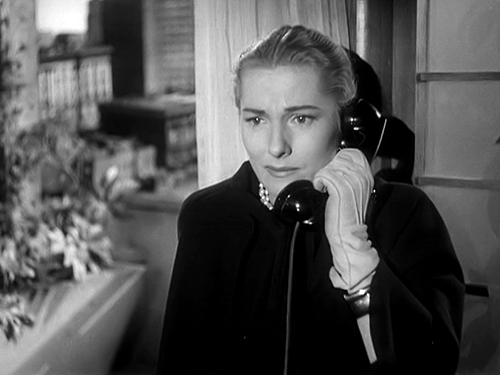
“Any woman who wishes to smash into the world of men isn’t very feminine […] Baby, we can’t go smashing. I believe women should be struck regularly – like a gong. Or is it bong? If a woman has a man who loves her, she better stick close to home. I’ve turned down jobs in Europe because I’d have to leave my husband and my daughter and my cats. I couldn’t accept those jobs unless I was a guy.”
Ida Lupino 1
“At first glance, The Bigamist appears to be yet another film putting forth a plea for understanding for one hapless, misguided man. However, the casting of Fontaine and Lupino in their roles offers a critique of postwar sexual mores: Young was Lupino’s ex-husband and Fontaine’s husband at the time.
The couples were so close, in fact, that Young and Fontaine were named the godparents of Lupino’s child with her new husband, although she had become pregnant while still technically married to Young. Considering this, the film’s casting can be seen as a reflection of its makers’ commitment to an enlightened attitude toward the topics of adultery and out-of-wedlock pregnancy. Lupino and Young, in their own way, turned their attention to aspects of their own lives to produce a distinctive challenge to the postwar American ideal of heteronormative marriage. [...]
Marion is a scathing condemnation of the 1950’s American ideal of womanhood. Although we should be feeling sympathy for her as the woman that Cliff is planning to betray and abandon, of all of the main characters, she is the closest to being a coded symbol. She is a woman who is never ‘off,’ never for a moment deviating from her prescribed role or treating it with irony. Her opacity leaves the viewer free to speculate about how she became the way she is, which is easy enough to do. Marion approaches raising her children and managing the household as a job, and one that, unlike Cliff, she can’t leave at the office. But there’s more to the sexual failure of their marriage than that. Marion has completely disappeared inside her gender role, and understood that it implicitly requires her to sacrifice her sexuality: once she has become a mother, she can no longer be a sexual being. Cliff, however, won’t accept being treated like another child by his wife, rather than a lover.”
Elise Moore2
- 1Ida Lupino, “Me, Mother Directress”, Action, 2.3, May-June 1967, 15.
- 2Elise Moore, “Everyday Untidy Love: Ida Lupino’s The Bigamist and Douglas Sirk’s There’s Always Tomorrow”, Cléo, vol. 5 issue 3, 2017.

